|
|
|
Sort Order |
|
|
|
Items / Page
|
|
|
|
|
|
|
| Srl | Item |
| 1 |
ID:
143404
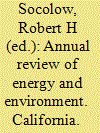

|
|
|
|
|
| Publication |
California, Annual Review, 2000.
|
| Description |
xiii, 857p.hbk
|
| Contents |
Vol. 25, 2000
|
| Standard Number |
0824323254
|
|
|
|
|
|
|
|
|
|
|
|
Copies: C:1/I:0,R:1,Q:0
Circulation
| Accession# | Call# | Current Location | Status | Policy | Location |
| 044621 | 333.79/SOC 044621 | Main | On Shelf | Reference books | |
|
|
|
|
| 2 |
ID:
119925
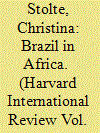

|
|
|
|
|
| Publication |
2012.
|
| Summary/Abstract |
In the shadow of China's and India's inroads into the African continent, South America's emerging power, Brazil, has been increasing its presence in Africa. However, its role in Africa has remained relatively unnoticed by international media and academia thus far. Brazil's low visibility in Africa cannot be explained exclusively by the fact that its financial engagement is still limited in comparison to that of China or India. An explanation would also need to include the unique way the South American power has interacted with Africa. Brazil has presented itself as a partner for Africa's development challenges rather than as a business partner. Although Brazil primarily imports oil and other natural resources from Africa, Brazil's cooperation with African countries, in contrast to that of China or India, has not been tied to contracts for oil-drilling or mining concessions. In fact, Brazil's expanding engagement in Africa serves other motives than resource-seeking. Brazil is trying to gain status as a global player by acting as a provider of development assistance and demonstrating global leadership on pressing international issues such as poverty alleviation, the fight against AIDS, or the provision of energy security.
|
|
|
|
|
|
|
|
|
|
|
|
|
|
|
|
| 3 |
ID:
174789
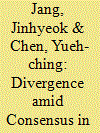

|
|
|
|
|
| Summary/Abstract |
This paper examines the nature of cohesive patterns of roll call voting behavior across international issues among the 10 member countries of the Association of Southeast Asian Nations (ASEAN) in the United Nations General Assembly (UNGA). Existing studies reveal a high level of foreign policy convergence among these countries. By incorporating several international issues, we set out to advance the scholarly understanding of the ASEAN states’ voting convergence in the UNGA. Our bill-level analysis of voting similarity in the post-Cold War period shows that the respective voting patterns vary across issues on arms control and disarmament, colonialism, economic development, human rights, nuclear weapons and nuclear material, as well as the Palestinian conflict. These findings highlight the ideas and interests of Southeast Asian countries across different foreign policy contexts.
|
|
|
|
|
|
|
|
|
|
|
|
|
|
|
|
| 4 |
ID:
129430
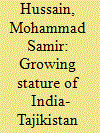

|
|
|
|
|
| Publication |
2014.
|
| Summary/Abstract |
'Tajikistan is a key partner of India in the Central Asian region' - Indian Prime Minister, Manmohan Singh, September 2012
The end of the Cold War, witnessed a dramatic transformation in the world order. India has concluded strategic partnership agreements with various regional and global partners such as the United States, Russia, France, Japan, Kazakhstan, Afghanistan, Uzbekistan etc. Tajikistan became the latest country to have concluded the strategic partnership agreement with India and the third among the Central Asian Republics (CARs) after Kazakhstan and Uzbekistan. The post-Cold War global strategic developments have brought India and Tajikistan closer to one another. Strategic partnership agreement makes a lot of sense when Tajikistan is considered India's gateway to Central Asia. Strategic partnership agreement is part of India's foreign policy goals to strengthen its presence in areas of interest to India and gaining
more strategic space. The agreement was signed during the visit of the President of the Republic of Tajikistan, Emomali Rahmon to India in September 2012. It was important in a way that it elevated the old close normal bilateral ties to strategic level. With this, both sides can now engage in a robust manner. The strategic importance of this partnership lies in sharing common perspectives on several international
and regional issues. In the 21st century, both sides would like to establish qualitatively new and mutually beneficial relations in the political, economic, military, development cooperation and in other areas.
|
|
|
|
|
|
|
|
|
|
|
|
|
|
|
|
| 5 |
ID:
123698


|
|
|
|
|
| Publication |
2013.
|
| Summary/Abstract |
Model United Nations (MUN) is a simulation in which students take on the roles of ambassadors to the United Nations, engaging in debate on 'real' issues from the perspective of their assumed national identities. This paper, based on a year of ethnography and interviews of a college-level MUN team, examines the role of humour in producing particular geopolitical imaginations among those participating and also in producing the MUN assemblage itself. Key here is the circulation of affects among participants' bodies, producing an orientation among them that facilitates debate and consensus-building. This finding is seen as a corrective to past work on geopolitics and humour, which has tended to emphasise irony and satire, as well as mass-mediated humor.
|
|
|
|
|
|
|
|
|
|
|
|
|
|
|
|
| 6 |
ID:
154800


|
|
|
|
|
| Publication |
Noida, HarperCollins Publishers, 2017.
|
| Description |
xvi, 325p.hbk
|
| Standard Number |
9789352770144
|
|
|
|
|
|
|
|
|
|
|
|
Copies: C:1/I:0,R:0,Q:0
Circulation
| Accession# | Call# | Current Location | Status | Policy | Location |
| 059162 | 330.954/RAJ 059162 | Main | On Shelf | General | |
|
|
|
|
| 7 |
ID:
133842
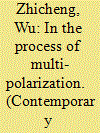

|
|
|
|
|
| Publication |
2014.
|
| Summary/Abstract |
The international system is the relatively stable framework of international relations constituted by various international actors, and represented by the great powers. The various international actors interact with one another in the framework. Therefore, against the current background of deepended globalization.
|
|
|
|
|
|
|
|
|
|
|
|
|
|
|
|
| 8 |
ID:
155499
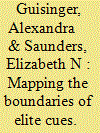

|
|
|
|
|
| Summary/Abstract |
When and how do elite messages shape mass opinion on international issues? Do informational or partisan components of elite cues dominate? Recent survey experiments offer conflicting insights. We argue that issue context matters, and that the single-issue nature of most survey experiments masks systematic variation in how elite cues affect attitudes across international issues. These effects depend on the baseline distribution of mass opinion on the issues themselves. Two characteristics of underlying opinion prove crucial: first, the share of those not aligned with expert opinion, and second, the degree of partisan polarization. Where polarization is limited, information effects should dominate. Where issues are polarized, information intake should be limited by partisan attribution. We test these hypotheses using nine survey experiments across a range of issues, including the rise of China, climate change, international institutions, and the use of force. At one extreme, all messages—even those endorsed by generic or opposition experts—can shift opinion; at the other, only partisan-attributed messages matter. Our findings are important not only for understanding public opinion about international issues but also for those interested in mobilizing opinion in a democratic setting.
|
|
|
|
|
|
|
|
|
|
|
|
|
|
|
|
| 9 |
ID:
091480
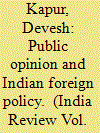

|
|
|
|
|
| Publication |
2009.
|
| Summary/Abstract |
Among the many factors that drive a country's foreign policy, the least understood is the role of public opinion. In any democracy, there is a presumption of some link, however weak and indirect, between public policy and public opinion, in so far as the latter represents voter preferences. But public opinion's links to foreign policy are more tenuous. In the Indian case there have been very few attempts to gauge public opinion on foreign policy issues, let alone to examine its effects on the country's foreign policy. This paper measures public opinion on Indian foreign policy through a survey of more than two hundred thousand households (the largest ever in India) and lays out some hypotheses on whether (and how) public opinion might effect Indian foreign policy in the future.
|
|
|
|
|
|
|
|
|
|
|
|
|
|
|
|
| 10 |
ID:
129190
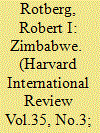

|
|
|
|
|
| Publication |
2014.
|
| Summary/Abstract |
What next? Following another marred election, what is to become of Zimbabwe? With alleged assistance rendous inflation by banning the Zimbabwe dollar as legal from Israel and China, President Mugabe was re-anointed president after a July election for another five-year term. He has been misruling Zimbabwe with an increasingly iron fist since 1980, governing since 1999 over a country with ever-diminishing GDP, many years of Weimar-like inflation, and deteriorating medical and educational outcomes. But Mugabe will be 90 in February. How long will he live? Who can succeed him?
|
|
|
|
|
|
|
|
|
|
|
|
|
|
|
|
|
|
|
|
|